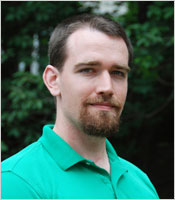Princeton doctoral candidate selected as William L. Fisher Congressional Geoscience Fellow
FOR IMMEDIATE RELEASE
Maureen Moses (mmoses@americangeosciences.org)
4/14/2014

Alexandria, Va. - The American Geosciences Institute would like to congratulate Princeton Ph.D. candidate, Joseph Majkut, on his recent selection as the 2014-2015 William L. Fisher Congressional Geoscience Fellow. He will spend a year in Washington, DC, working as a staff member in the office of a member of Congress or with a congressional committee.
Majkut is completing a Ph.D. in Atmospheric and Oceanic Studies at Princeton University. He is studying the ocean carbon cycle and how CO2 emissions, and the associated warming, affect the ability of the natural carbon sinks to remove excess CO2 from the atmosphere. In addition to traditional laboratory research methods, he also incorporated policy-focused elements into his research.
“I have been using what is called an integrated assessment model, common in the policy analysis world, to investigate how reductions in the uncertainty governing the carbon cycle feedbacks can help improve policy design and outcomes.” Majkut said. He attributes this work and other research experiences with helping him develop the skills necessary for approaching challenging problems faced by U.S. decision makers.
This fellowship provides geoscientists with a unique opportunity to gain first-hand experience in the legislative process and to make practical contributions to the effective and timely use of geoscience information on issues relating to the environment, resources, natural hazards, and other federal policies.
“I'm interested in developing a mature understanding of how science and engineering inform public policy.” Majkut said, “What kind of information can the sciences provide that is necessary for policymakers? How can scientific results be made pertinent, available and clearly communicated to policymakers? How can the scientific enterprise be advanced to help answer the challenges of the 21st century? These are all big and challenging questions, but I see the fellowship year as a great opportunity to start learning.”
Prior to his doctoral work at Princeton, Majkut held a Science, Technology, and Environmental Policy Fellowship at the Princeton Environmental Institute, completed an M.S. in risk analysis and environmental modeling at the Technical University of Delft in the Netherlands, and received his B.S. in mathematics with an emphasis in environmental policy from Harvey Mudd College. His internship experiences include working at Royal Dutch Shell and Stanford University. For more information on the William L. Fisher Geoscience Congressional Fellowship please go to: http://bit.ly/1hBhDQO.
###
The American Geosciences Institute is a nonprofit federation of 50 geoscientific and professional associations that represents more than 250,000 geologists, geophysicists and other earth scientists. Founded in 1948, AGI provides information services to geoscientists, serves as a voice of shared interests in the profession, plays a major role in strengthening geoscience education, and strives to increase public awareness of the vital role the geosciences play in society's use of resources, resiliency to natural hazards, and interaction with the environment.
